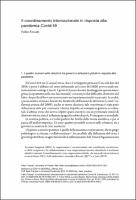Chapter Il coordinamento internazionale in risposta alla pandemia Covid-19
| dc.contributor.author | Fossati, Fabio | |
| dc.date.accessioned | 2022-12-22T16:05:18Z | |
| dc.date.available | 2022-12-22T16:05:18Z | |
| dc.date.issued | 2022 | |
| dc.identifier | ONIX_20221222_9788855185950_16 | |
| dc.identifier.issn | 2704-5919 | |
| dc.identifier.uri | https://library.oapen.org/handle/20.500.12657/60354 | |
| dc.language | Italian | |
| dc.relation.ispartofseries | Studi e saggi | |
| dc.subject.classification | thema EDItEUR::J Society and Social Sciences::JP Politics and government::JPA Political science and theory | en_US |
| dc.subject.other | Coordination | |
| dc.subject.other | Conflict | |
| dc.subject.other | Anarchy | |
| dc.subject.other | International regimes | |
| dc.subject.other | Pandemic | |
| dc.title | Chapter Il coordinamento internazionale in risposta alla pandemia Covid-19 | |
| dc.type | chapter | |
| oapen.abstract.otherlanguage | Collaboration is an intense cooperation aimed at realizing common objectives; coordination wants to avoid adverse interests. There is anarchy when governments make unilateral decisions. In conflicts actors have incompatible scopes. The World Health Organization implemented some standards to help governments to manage the sanitary emergence. The communication network of health technicians has informally pushed governments to apply those standards. Eastern Asian states were faster in their reactions than Western countries. Coordination worked with the diffusion of informal norms and not of codified and binding regimes of international law. Sweden did not fully apply those standards, but without deep objections and with ad hoc exceptions. Taiwan’s standards were even more efficient than WHO. | |
| oapen.identifier.doi | 10.36253/978-88-5518-595-0.07 | |
| oapen.relation.isPublishedBy | bf65d21a-78e5-4ba2-983a-dbfa90962870 | |
| oapen.relation.isbn | 9788855185950 | |
| oapen.series.number | 238 | |
| oapen.pages | 11 | |
| oapen.place.publication | Florence |

